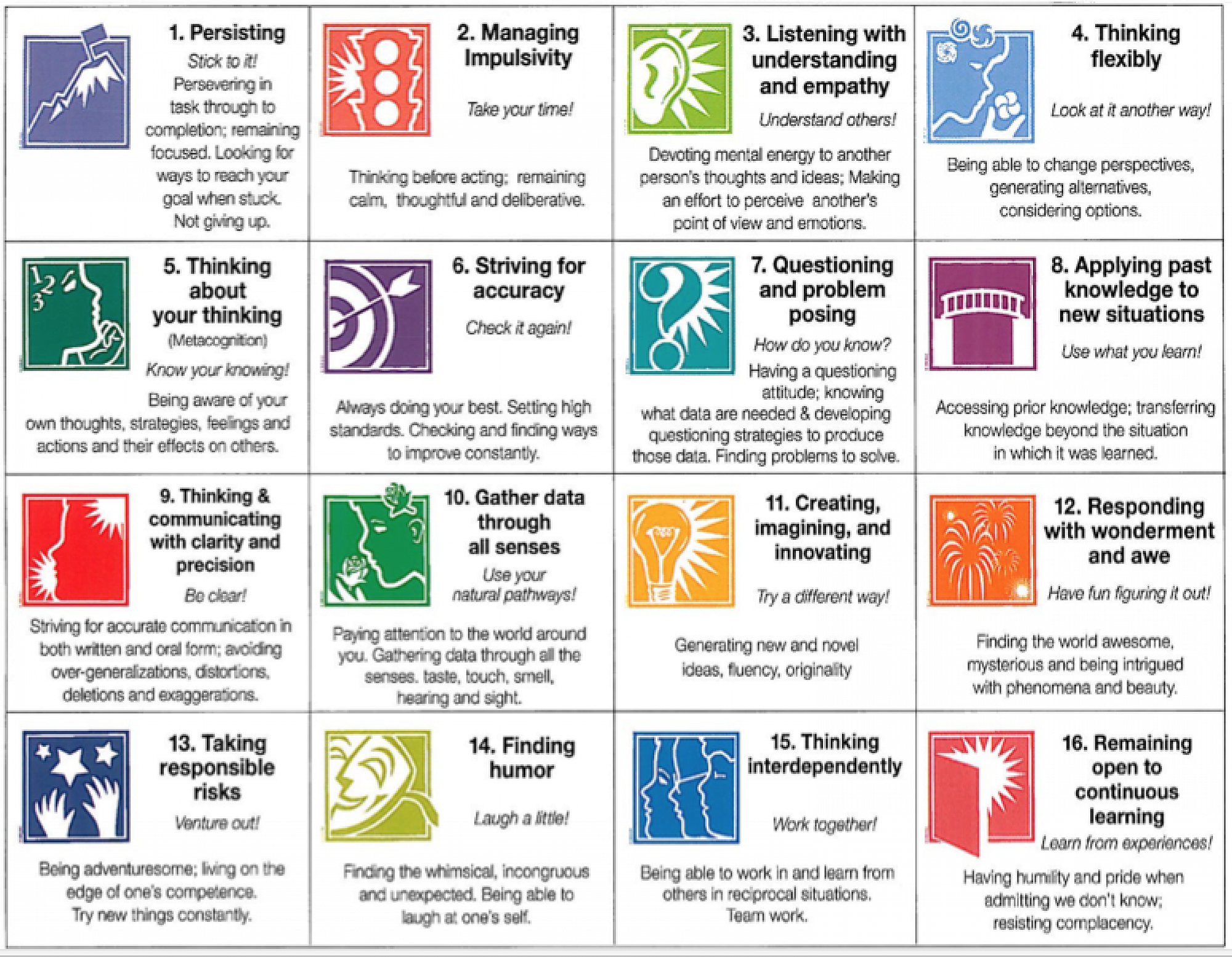Karen Boyes from Spectrum Education, and her website.
2 billion jobs will be eliminated by 2030 – when there is a void, they will be replaced, vacuum theory. People will have to create their own jobs because we don’t know what these jobs will be. Children will not be walking in our shoes. 40% of our 5 year olds will be self-employed when they leave school. There are so many things about being self-employed that are complex.
Change is happening. Do you create it? Embrace it? Fight it? Ignore it? – Megan Gallagher
It’s not how much you know? What do you do when you don’t know what to do?
Thinking Dispositions – Art Costa and Bena Kallick
 Persisting
Persisting
Fighting learned helpless – helicopter parents that hover or lawnmower parents (push the mower through and then make it safe for the students). Parents need to be re-empowered to parent. Life is about making things easy for you. Clean products: jiff, spray and wipe, wet and forget. We have to let students struggle, for them to navigate the hard times. The struggle makes you strong.
Often students see themselves as passive participants and they need the the opportunity to learn to be active and do it for themselves. The road to success is paved with persistence.
What do students do when they try to avoid work in the classroom? How do you avoid avoidance? Kids are experts at this. We need to recognise it, label it and challenge what they are avoiding. Teach them how to persist.
Listening with Understanding and Empathy
We spend 55% of time listening, but how often is it taught?
Mirror neurons – don’t worry that your children [or students] are listening to you, worry that they are always watching you. Our brain is wired to mirror and reflect actions that we see from role models. (Links here to spectatorship). Be the person we want to them to be. Children that are brought up in a home where they are listened to are good listeners. The importance of sitting at the family dinner table and talking and listening.
Creating, imagining and innovating
We want to stop the technology and the television so we can allow the creativity to flourish. They have to be allowed to be bored. We can’t always fill the space in which they are bored. Cut the technology time. Have time with no agenda, or with their own agenda. Use of genius time or 20% time.
Restrict access to resources. Peter Jackson is Peter Jackson because he had nothing and had to create, imagine and innovate. The irony of it is that he is now using the money he has made to fund schools with equipment and access to the resources that made him unique.
Remaining open to to continuous learning
“Study Tip: Learn the information I don’t know”. What in the world have we done in schools if we haven’t taught students to find out what they don’t know? The school exams are the most important exams they will sit each year.
Relook at school marks – an A+ shows that they haven’t been pushed and that they don’t know what they need to learn next. The growth mindset from Carol Dweck. We have to find the point where the natural talent isn’t enough, so they can learn and grow.
Never work harder than the students. We have to switch those roles.
Next steps/Reflection:
- How do the thinking dispositions and key competencies fit together? In sharing these ideas with other staff members will it come across as another thing or does it need to be relabeled? How could I use them effectively in the current context? Needs to be a whole school approach. What is the ‘in’?
- We talk a lot about resilience already, so therefore do we need to recapture the importance of this by calling it ‘persistence’? Could a shift in language be valuable?
- This is a highly valuable toolkit to have access to.

5 thoughts on “ULearn – Thinking and Leading with Thinking Dispositions”